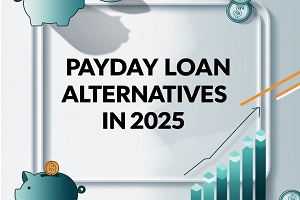Payday Loan v/s Installment Loan : choose cautiously
Payday loans and Installment loans are two common options for short-term and medium-term financing in the United States.
While both provide quick access to cash, they are designed to serve different needs and come with different benefits and downsides.
Understanding the differences between payday loans and installment loans can help borrowers make informed financial decisions based on their circumstances.
In this article, we’ll explore the difference between payday loans and installment loans, and which one you should go for as per your present financial status.
What Are Payday Loans?
First let’s understand what exactly are Payday Loans.
Payday loans are short-term, high-interest loans typically intended to help people cover immediate expenses until their next paycheck.
They are usually offered in small amounts, ranging from $100 to $1,000, and are expected to be repaid within two to four weeks, depending on the borrower’s pay schedule.
Payday loans are known for their quick availability, as they are widely and quickly available online and through storefront lenders and generally don’t require a credit check.
Payday loans are designed to address urgent financial needs and are often marketed as quick solutions to cash flow issues, such as covering unexpected bills or emergency expenses.
However, they come with high fees and APRs (annual percentage rates), which can quickly add up if borrowers are unable to repay the Payday loan in time.
Let’s find out why Payday Loans are so famous.
Benefits of Payday Loans
- Quick Approvals and Funding : Payday loans are usually approved within minutes, and funds are available almost immediately, often within 24 hours. Which is why people who are in urgent need of money, go for a Payday Loan.
- Minimal Requirements : To acquire Payday loans, lender don’t typically require credit checks of the Payday Loan borowwer. This kind of Loan is mostly available to individuals even with low a low credit score or even to one who has no credit history.
- Convenience: Payday loans are widely available through physical locations and online platforms, allowing borrowers to apply at any time and from any location.
No Collateral Needed: Payday loans are unsecured, meaning they do not require collateral, which can be beneficial for borrowers who don’t want to risk their assets.
Disadvantages of Payday Loans
- High Interest Rates and Fees: Payday loans have exceptionally high APRs, often ranging from 300% to 700%, which makes them very costly if not repaid on time.
- Short Repayment Periods: The short repayment window, usually two to four weeks, can make it difficult for borrowers to repay the loan by the due date, especially if they are already in financial distress.
- Debt Cycle Risk: Many borrowers find themselves in a “debt cycle,” where they have to take out another payday loan to pay off the first one. This cycle of borrowing can lead to long-term financial stress and increasing debt.
Limited Loan Amounts: Payday loans are capped at small amounts, which may not be sufficient for significant expenses, making them suitable only for immediate and minor financial needs.
What Are Installment Loans?
Installment loans are loans that are repaid over time in fixed, regular payments, known as installments.
They can be used for various purposes, including personal expenses, medical bills, home improvement, and more. Installment loans typically range from $1,000 to $50,000 or even higher, depending on the lender and borrower’s creditworthiness. Unlike payday loans, installment loans have longer repayment periods, often ranging from a few months to several years.
Installment loans can either be secured, requiring collateral like a car or home, or unsecured, where no collateral is needed. They are available through banks, credit unions, and online lenders. Most installment loans involve a credit check, so they are generally geared towards borrowers with fair to good credit.
Benefits of Installment Loans
- Flexible Repayment Terms: Installment loans come with longer repayment periods, allowing borrowers to make manageable monthly payments rather than repaying the entire loan at once.
- Lower Interest Rates: Installment loans generally have lower interest rates than payday loans, especially if the borrower has good credit. The lower APR helps reduce the total cost of the loan.
- Higher Loan Amounts: Installment loans can provide more substantial funds, making them suitable for larger expenses such as debt consolidation, home improvement, or medical bills.
Credit-Building Potential: Consistently repaying an installment loan on time can help build and improve a borrower’s credit score, as most installment loans are reported to credit bureaus.
Disadvantages of Installment Loans
- Longer Application Process: Installment loans typically require credit checks and may involve more documentation than payday loans, which can make the application and approval process slower.
- Requires Good Credit for Best Rates: While installment loans are available to those with fair credit, borrowers with low credit scores may receive higher interest rates, making the loan more costly.
- Possibility of Collateral Requirements: Some installment loans, particularly larger ones, may require collateral, which puts the borrower’s asset at risk in the event of default.
Potential for Prepayment Penalties: Some lenders charge prepayment penalties on installment loans, making it more expensive for borrowers to pay off the loan early.
Key Differences Between Payday Loans and Installment Loans
| Aspect | Payday Loans | Installment Loans |
| Loan Amounts | $100 to $1,000 | $1,000 to $50,000 or more |
| Repayment Period | 2 to 4 weeks | Months to years |
| Interest Rates | Extremely high (300%-700% APR) | Lower, typically 5%-35% APR |
| Credit Requirements | Minimal, no credit check | Moderate to high, with credit check |
| Funding Speed | Immediate or within 24 hours | 1-7 business days, depending on the lender |
| Purpose | Small, short-term needs | Large, medium- to long-term expenses |
| Collateral | No collateral required | May require collateral (secured loans) |
| Loan Accessibility | Accessible to borrowers with low credit | Primarily accessible to those with fair to good credit |
Choosing the Right Loan for Your Needs
Choosing between a payday loan and an installment loan depends largely on the borrower’s financial needs, credit score, and repayment capabilities. Here are some scenarios where one type of loan might be more suitable than the other:
- Payday Loan: Suitable for small, immediate expenses when there are no other options. Payday loans are accessible for borrowers who have bad credit or no credit history but should only be considered when there is a clear plan to repay the loan by the next paycheck.
- Installment Loan: A better option for more substantial expenses, longer repayment needs, or borrowers who qualify for better rates due to their credit score. Installment loans are also ideal for debt consolidation or covering major purchases, as the structured repayment schedule and lower interest rates make it easier to manage monthly payments.
Pros and Cons at a Glance
| Loan Type | Pros | Cons |
| Payday Loan | Fast access, no credit check | High interest, short repayment, debt cycle risk |
| Installment Loan | Flexible terms, lower rates, credit-building | May require good credit, longer approval process |
Which Loan Type is Better?
Payday loans and installment loans each have distinct purposes, and their usefulness depends on the borrower’s unique situation. Payday loans are risky due to their high-interest rates and short repayment terms, so they’re best suited as a last resort for immediate, emergency cash needs.
Installment loans, on the other hand, are generally more borrower-friendly. They come with longer repayment periods, lower interest rates, and the potential to build credit. For individuals with fair to good credit who need a substantial amount of money for major expenses, installment loans are usually the better choice.
Borrowers should carefully assess their needs, repayment abilities, and financial situations before deciding on a loan type. For long-term financial stability, installment loans are the more responsible choice. But for those who are in urgent need with limited alternatives, a payday loan may offer a temporary solution—just with a higher cost.
Understanding the benefits and drawbacks of each loan type allows borrowers to make informed decisions that align with their financial goals.



